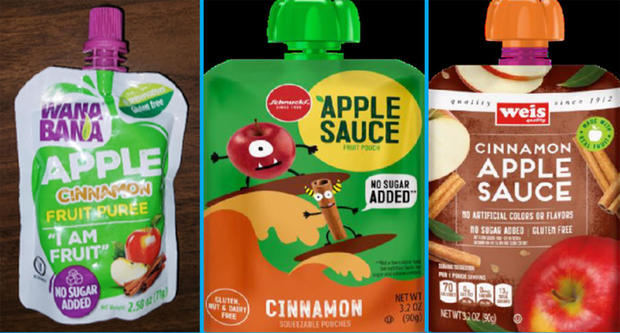
Recalled applesauce pouches now linked to more than 200 lead poisoning cases in 33 states, CDC says
Health authorities are now investigating at least 205 cases of lead poisonings across 33 different states linked to contaminated applesauce, the Centers for Disease Control and Prevention announced Tuesday. That’s up from 125 cases in the agency’s last weekly tally.
The growing case count comes as the Food and Drug Administration continues its probe into the source of the tainted cinnamon blamed for the contamination. The FDA has faced “limited jurisdiction” in Ecuador, where the FDA says it cannot take “direct action” to investigate some of those suspected to be behind the poisonings.
State health departments reporting cases to CDC now also include Alabama, Arkansas, Georgia, Maine, Michigan, Missouri, Montana, North Dakota, Pennsylvania, Virginia and Washington — along with more than 20 other states that previously reported cases.
blood tests from their doctor for the toxic heavy metal.
Most previously reported cases have been in young children who are especially vulnerable to developmental issues caused by lead poisonings. Some young children had been consuming the pouches multiple times a day, according to early reports so far released by the FDA in response to a records request by CBS News.
AustroFood, manufacturer of the now-recalled WanaBana, Weis and Schnucks brand cinnamon-flavored applesauce pouches, said Monday it will reimburse customers for up to $150 for lead tests.
FDA / AP
Officials have also struggled to get pouches off store shelves, following the initial recall in late October.
The FDA had been continuing to field reports of the pouches in Dollar Tree stores for weeks, prompting a joint effort with state and local health authorities to canvas locations with the lead-tainted pouches still being displayed on shelves.
“FDA is aware that, as of December 13, recalled WanaBana Apple Cinnamon Puree product (including recalled three packs) was still on the shelves at several Dollar Tree stores in multiple states,” the agency said in an update Monday.
One theory: “Economically motivated adulteration”
Testing by FDA investigators from AustroFood’s plant in Ecuador found that cinnamon which had been added to the applesauce pouches was contaminated with “extremely high” concentrations — as much as 5,110 parts per million — of lead.
That is thousands of times above than what experts generally consider is the safe maximum level of lead in spices, the FDA says.
A congressional report calling for cracking down on dangerous lead levels in baby food had voiced concern over concentrations at a fraction of that size.
One theory the FDA has been exploring is whether the cinnamon was contaminated as the result of “economically motivated adulteration,” an agency spokesperson said. Economically motivated adulteration is when a person or company swaps ingredients or adds filler to make a product more profitable — the FDA also refers to it as “food fraud.” An agency spokesperson declined to identify what other theories investigators have been pursuing.
In the past, other spices like turmeric linked to lead poisonings have been suspected to have been contaminated by sellers trying to enhance its weight and color.
The contaminated cinnamon is suspected to have been supplied through a distributor in Ecuador called Negasmart, sourced from a grinder in the country that is now closed.
But beyond AustroFood’s own factory, the FDA says it is “still relying on officials in Ecuador to support the investigation into Negasmart,” given it did not directly ship its products to the U.S.
“We’re relying on what Ecuador is giving us. They’ve had a change of leadership recently and it’s taking a little bit of time for us to get that information,” an FDA official said Friday, in a call with state and local health authorities.
The official said the FDA had been waiting on answers from Ecuador’s regulatory authorities to trace the contaminated cinnamon. FDA’s Ecuadorian counterpart, the Agencia Nacional de Regulación, Control y Vigilancia Sanitaria or ARCSA, swore in a new director on Dec. 6.
Meanwhile, more than a hundred other food samples tested by the FDA and state authorities for lead have tested negative, the FDA says. Samples testing negative include other non-cinnamon flavors of WanaBana that ARCSA had initially claimed could also be contaminated.
AustroFood was Negasmart’s only customer that exports food to the U.S., the FDA says. Other cinnamon imports screened by the FDA have not been found to have elevated lead levels.
Testing from other cinnamon importers in Ecuador “do not appear to be contaminated with lead,” the FDA said ARCSA had told them.
“We are continuing to work closely with Ecuadorian officials, as they are conducting their own rapidly evolving investigations into the source of contamination,” the FDA said.
Alexander Tin
Source: cbsnews.com